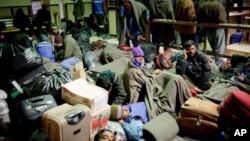United Nations aid agencies report food and other essential supplies are running out in Libya. They say it is becoming increasingly difficult to provide humanitarian assistance to thousands of internally displaced people as the war in the country heats up.
The U.N. refugee agency (UNHCR) says new arrivals at the Egyptian-Libyan border are telling its staff thousands of Libyans are displaced in the east of the country. It says people displaced in the cities of Ajdabiya, Derna and Tubruk are taking refuge in homes, schools and university halls.
UNHCR spokesman Adrian Edwards says it is very difficult to provide humanitarian assistance to the displaced under current conditions of instability and violence.
He says there are reports of shortages of medical supplies and basic commodities in the eastern part of the country. He says prices have risen sharply.
“Libyans at the Egyptian border told UNHCR they feared reprisal attacks by pro-government supporters in eastern parts of the country," said Edwards. "They say people are afraid to go out after 4 p.m. Some have seen their homes completely destroyed. One man returned to Ajdabiya over the weekend to find four rockets had flattened his home. He then had to return back to the border. Mobile phone networks have not been working since Thursday, increasing the sense of uncertainty.”
Edwards says the UNHCR plans to send truckloads of aid Wednesday on a World Food Program (WFP) convoy to Benghazi. This will include 5,000 blankets and 5,000 sleeping mats for the homeless.
In the meantime, the WFP says it is stepping up provision of food to hungry people crossing Libya’s borders. It also is airlifting and pre-positioning portable warehouses and office equipment as part of regional contingency plans to support humanitarian assistance.
WFP spokeswoman Emilia Casella says her agency has moved more than 1,500 metric tons of food into eastern Libya and pre-positioned more than 6,000 metric tons of food in emergency supplies.
She says the World Food Program is particularly concerned about access to food for people in Libya.
“We have had reports from people who have made it to the border that the price of wheat and bread has more than doubled," said Casella. "The price of rice has gone up 88 percent, oil about 58 percent and many, many - I mean the vast majority of the shops in places such as Zawiya, Misrata and Sirte have been closed. So, there is great concern about the ability for people to access the food that is in the country and whether or not there is enough food in the country for those who need it.”
In addition, Casella says the World Food Program is providing an average of 4,000 hot meals a day at Djerba Airport in Tunisia. She says there also are plans to provide hot meals for people stranded on the Libyan-Egyptian border.
She says the agency is expanding its food safety net programs in Egypt and Tunisia to assist 180,000 people in communities hard hit by the loss of remittances previously being sent home by migrant workers in Libya.
UN Reports Shortages of Food, Other Essentials in Libya
- By Lisa Schlein




